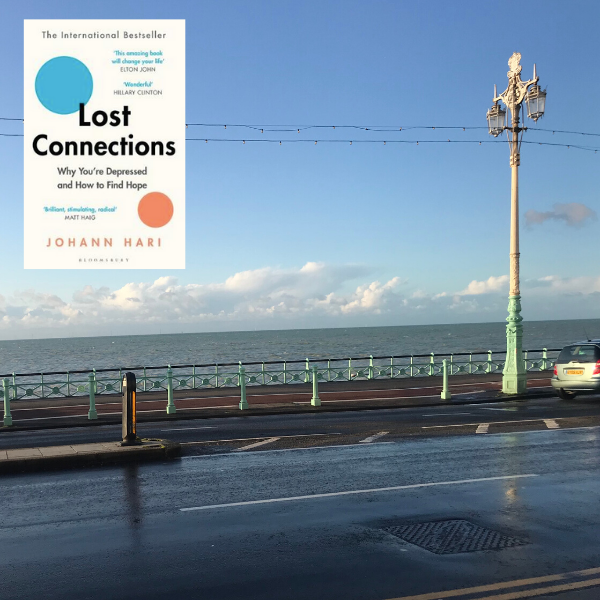It took hearing my friend and many other people rave about Lost Connections before I decided a book on depression and anxiety could capture my attention. Here’s why I think this is a book everyone should read:
- It is very likely that most of us have at least one person around us who does depression and / or anxiety
- We are biased beings and we often don’t even realise it. This book will make us aware and uninstall some of those biases
- Along with data and facts, Johann Hari includes many stories about himself and his own experience with depression
- The stories and anecdotes included are interesting and surprising and demonstrate how solutions sometimes come from unexpected places. Spoiler alert – nothing to do with antidepressants
- Albeit it’s based on research (yes, the sociologist in me loved the data-related bits), it’s written in an accessible manner and with a structure that’s meant to take you on a journey rather than lecture you on the topic
What’s Lost Connections about?
Lost Connection starts with Hari’s own story with depression from an early age, his many visits to doctors who constantly increased his doses of antidepressants and his conviction that depression is caused by imbalances in the brain – the almost unanimously agreed on culprit in the Western medicine 30-40 years ago. Once this myth is debunked – Hari does find the source of this misconception, including how it became fact although it stemmed from a presupposition – he moves on to talk about the nine causes of depression he identified and then offers solutions for each of them.
Nine causes of depression and anxiety:
- Disconnection from meaningful work
- Disconnection from other people
- Disconnection from meaningful values
- Disconnection from childhood trauma
- Disconnection from status and respect
- Disconnection from the natural world
- Disconnection from a hopeful or secure future
- The role of genes and brain changes
A few learnings, thoughts and connections of my own
- My thoughts on depression (and other, not necessarily, chronic dis-ease)
Chronic diseases suffer from stigma, misunderstanding and therefore biases on one hand and are generally treated with handfuls of pills which make the pharma industry so profitable on the other hand.
I’m lucky, I come from a family where chronic dis-ease is uncommon, I first thought seriously about the topic while being trained in Neuro-Linguistic Programming (NLP). According to NLP, any and all dis-ease (and yes, I will keep on spelling it this way) have an emotional cause. The greater and / or the more prolonged the emotional stress, the more serious the dis-ease, regardless whether the dis-ease affects the physical body or affects the person mentally.
This model is in line with Johann Hari’s discoveries and they support each other – the first seven causes of depression, which are also the most common, are all connected with a person’s problem at the emotional level.
- This brings me to the first year of my BA in sociology
One of the first books I’ve read while studying sociology was Durkheim’s The Suicide. He divided suicide into four kinds and, according to Durkheim, depression is one of the causes for Egoistic suicide, the type of suicide people who are not integrated in a community commit. He concluded that suicide rates are higher among single people, among people without children than without, among Protestants than Catholics and Jews.
Durkheim’s book dates from 1897, when communities were much tighter and people had stronger connections. The advent of the internet, digital devices, greater cities, busier lives and the individualistic and material culture we live in are all impacting the causes for suicide, and also the causes for depression.
- Natural world
I was somehow surprised to see the disconnection from the natural world as a cause for depression and I find that it makes sense. Firstly, being in nature presupposes being more active or, differently said, you are changing your physiology. Our physiology impacts how we feel and the other way around. Of course, the connection with nature must mean more than going for a walk – albeit even a walk has an impact on how we feel. I suspect part of the answer is the energy nature provides us with, from feeling the sunshine on our skin to the beauty it presents to us any any and all seasons.
I’ve been living in London for 10 years now and the one thing I keep missing is nature. As a scout, I used to often go on camps and day trips in the mountains so if there’s one thing I’m longing for is being out in nature.
- Lost Connections and Michael Pollan’s How to Change Your Mind
I was glad to see Johann Hari talk about the use of psychedelics as treatment for depression. While much of the research with psychedelics done in the 50s and 60s is questionable due to the way it was carried out, this book wouldn’t have been complete without mentioning the new research that does comply with today’s standards. Also, on a personal note, the research from the 50s and 60s couldn’t have been that wrong – if it had been, the “establishment” wouldn’t have been so quick to put it in the closet and deem the substances illegal.
- Hopeful and secure future vs freelancing and entrepreneurship
I gotta admit, I’m still pondering on this one. Freelancing and entrepreneurship, for me, are synonymous with freedom – freedom to do work that I love, work that matters and be paid for it. Hari though argues that while it’s hip to be an entrepreneur or a freelancer, this status comes with a lot of (financial) insecurity, which in turn can create anxiety and depression. And it’s true, getting out of the rat race is stressful and does create insecurity, whereas being in the rat race has it’s own hurdles.
In the same context, Hari talks about the concept of universal basic income, which would ensure that no matter what happens and what kind of work one does and for whom, we would all be able to lead a good life. From an abundance mindset, where money is infinite and we can always produce more on the one hand, and considering the (little) research that has been done on the positive effects of having a guaranteed basic income, maybe Hari is right, maybe having a universal basic income AND choosing where and how we work to supplement that income would not just not cause depression, but would allow more people to do meaningful work and be happier. This section from Lost Connections added a new book on my reading list – Rutger Bregman’s Utopia for Realists
How am I applying the learnings from Lost Connections?
I’m a happy and optimistic person who is very close to her family, has a great personal life and is close to her circle of friends. Learning from Lost Connections, there are three actions I’ve taken:
- Over the years I’ve been keeping a list of people who I’m not often in contact with and I do want to keep in touch with even if sporadically. While I am keeping this list at the back of my results enabling tool, I decided that starting with the 2020 edition, I am including a section in the monthly spread called “People I’m catching up with”, which shows more intention in this sense and brings it closer to the daily activities. If you’re not sure what my results enabling tool is, you can read more about it on www.ancaurdea.com/makeithappen
- I’m making a point of getting out in nature more. About a month ago I had an overnight escape to Brighton thanks to Diana. It was a Wednesday, we left in the evening, attended an A-Ha concert, spent the night in a cute place by the sea and I was back on a train to London by 9am. It was short, yes, but I got to see the sea, I danced and partied with great music and even better company, I walked along the streets of Brighton in the morning, enjoying the sunshine and collecting a glorious brownie for breakfast – it all recharged my batteries and left me energetic and in great spirits for the whole day. This escape was an exception and I’m making it a regular stint for 2020.
- And as mentioned, I’m adding Rutger Bregman’s Utopia for Realists to my reading list for 2020.
Are you struggling right now? Book a free session to end it!


